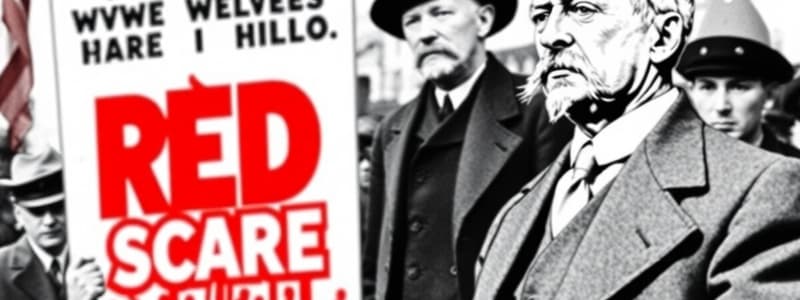Podcast
Questions and Answers
What was the primary reason for the government's concern about "hyphenated-Americans" during World War I?
What was the primary reason for the government's concern about "hyphenated-Americans" during World War I?
- They actively protested against the war effort and encouraged others to do the same.
- Their loyalty to the United States was questioned due to their ties to their homelands. (correct)
- They were believed to be spies working for foreign powers.
- They were seen as a threat to the economic stability of the country.
What was the main purpose of the Committee on Public Information (CPI)?
What was the main purpose of the Committee on Public Information (CPI)?
- To spread propaganda and mobilize public support for the war effort. (correct)
- To investigate and prosecute individuals suspected of espionage.
- To provide humanitarian aid to war-torn countries.
- To promote economic growth through wartime production.
Which of the following actions were taken against Germans in the United States during World War I?
Which of the following actions were taken against Germans in the United States during World War I?
- They were subjected to widespread violence and discrimination.
- They were prohibited from speaking German in public. (correct)
- They were forced to renounce their citizenship and leave the country.
- They were denied access to essential resources like food and medicine.
What was the Espionage Act of 1917 designed to do?
What was the Espionage Act of 1917 designed to do?
Which of the following statements accurately describes the Sedition Act of 1918?
Which of the following statements accurately describes the Sedition Act of 1918?
What was the fate of Eugene V. Debs, who was sentenced under the Espionage Act/Sedition Act?
What was the fate of Eugene V. Debs, who was sentenced under the Espionage Act/Sedition Act?
Why was the IWW (International Workers of the World) viewed with suspicion by many Americans during World War I?
Why was the IWW (International Workers of the World) viewed with suspicion by many Americans during World War I?
What was the outcome of Big Bill Haywood's case involving the Espionage Act of 1917?
What was the outcome of Big Bill Haywood's case involving the Espionage Act of 1917?
What was a significant outcome of the general strike in Seattle?
What was a significant outcome of the general strike in Seattle?
Why was the government suspicious of labor organizations?
Why was the government suspicious of labor organizations?
What event marked the U.S.'s first major general strike?
What event marked the U.S.'s first major general strike?
What was the reaction of Attorney General A. Mitchell Palmer after the bomb blasts in June 1919?
What was the reaction of Attorney General A. Mitchell Palmer after the bomb blasts in June 1919?
What organization was established to defend the Bill of Rights during the first Red Scare?
What organization was established to defend the Bill of Rights during the first Red Scare?
How did J. Edgar Hoover's actions reflect societal attitudes during the Red Scare?
How did J. Edgar Hoover's actions reflect societal attitudes during the Red Scare?
Which group saw a resurgence in the 1920s partly due to perceived threats from other communities?
Which group saw a resurgence in the 1920s partly due to perceived threats from other communities?
What core principle does the ACLU aim to protect?
What core principle does the ACLU aim to protect?
Flashcards
Hyphenated-Americans?
Hyphenated-Americans?
The fear that people who weren't born in the USA might be loyal to their home country, especially in a war.
What was the CPI?
What was the CPI?
The US government's propaganda agency during WWI, spreading messages and promoting patriotism.
How did the Espionage Act stifle dissent?
How did the Espionage Act stifle dissent?
The act of making something criminal, even if it's just speaking against the government or criticizing the war.
What is the Sedition Act?
What is the Sedition Act?
Signup and view all the flashcards
Eugene V. Debs's fate?
Eugene V. Debs's fate?
Signup and view all the flashcards
Who was the IWW?
Who was the IWW?
Signup and view all the flashcards
Big Bill Haywood's story?
Big Bill Haywood's story?
Signup and view all the flashcards
What happened after WWI?
What happened after WWI?
Signup and view all the flashcards
First Red Scare
First Red Scare
Signup and view all the flashcards
Seattle General Strike
Seattle General Strike
Signup and view all the flashcards
1919 Bombings
1919 Bombings
Signup and view all the flashcards
J. Edgar Hoover
J. Edgar Hoover
Signup and view all the flashcards
ACLU (American Civil Liberties Union)
ACLU (American Civil Liberties Union)
Signup and view all the flashcards
KKK Resurgence in the 1920s
KKK Resurgence in the 1920s
Signup and view all the flashcards
Freedom of Speech
Freedom of Speech
Signup and view all the flashcards
Significance of the Seattle General Strike
Significance of the Seattle General Strike
Signup and view all the flashcards
Study Notes
Red Scare and Immigration
- The US government was concerned about people loyal to other countries during WWI, leading to the formation of the Committee on Public Information (CPI).
- The CPI was a propaganda agency, creating posters, pamphlets, and films to promote loyalty and support for the war effort.
- Anti-German sentiment was high, leading to changes in names and symbols associated with German culture, which were redirected towards communists, anarchists, and socialists after the war.
- The Espionage Act criminalized opposition to the war, while the Sedition Act expanded this to include criticism of the government.
- Eugene V. Debs was sentenced to prison under these acts for his criticism of the war.
- The IWW (Industrial Workers of the World) was a labor union viewed with skepticism due to ties to socialist/anarchist movements.
- Big Bill Haywood, a prominent IWW leader, was convicted and fled to Russia.
- Labor organizations in general were viewed with suspicion by the US government.
- The 1919 Seattle General Strike demonstrated worker solidarity, alarming the government and businesses as a potential sign of communism.
Anarchist Bombings and Civil Liberties
- Anarchist bombings in 8 Northeast cities in June 1919 shocked the nation and targeted Attorney General A. Mitchell Palmer.
- Palmer's response was to launch raids on radical and labor organizations throughout the country, with 24-year-old J. Edgar Hoover overseeing the raids.
- The American Civil Liberties Union (ACLU) was created to defend civil liberties, including freedom of speech, religion, press, and the right to assemble.
- Civil liberties are crucial for individuals to freely express themselves, think, and act.
Immigration Act of 1924
- The Immigration Act of 1924 aimed to limit immigration from various countries, based on the 1890 census.
- The Act drastically impacted immigration from Italy and Russia, significantly reducing their populations. It also barred Japanese immigration.
- The act aimed to curb immigration from Southern and Eastern Europe.
- This Act changed the demographic and political nature of the nation long-term.
Studying That Suits You
Use AI to generate personalized quizzes and flashcards to suit your learning preferences.




